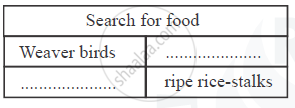Advertisements
Advertisements
Question
Attempt a character sketch of Squire Cass.
Solution
Squire Cass is a contender for the narrator's Least Favorite Character. Sure, Dunstan is bad—but look at who he's got for a dad. He's bad-tempered, neglectful, slovenly, and arrogant. The only possible good thing about him is that he has the "self-possession and authoritativeness" that some of his neighbors lack. He enjoys throwing his annual New Year's Eve party not because he likes company but because he likes showing off and performing his "hereditary duty of being noisily jovial and patronizing". You have to feel a little sorry for Squire Cass, though, because his reign of triumph is coming to an end. The only reason he thinks highly of himself is that his society is so confined that he's just never been around anyone superior. He may be at the top of Raveloe society, but, as England becomes unified as a nation, isolated pockets like Raveloe will no longer exist. It'll be impossible for a country squire to go on thinking that he's better than everyone else, because railroads and newspapers and other forms of mass communication and mass culture will introduce him, however unwilling, to a larger world. Added to that, the Napoleonic Wars are almost over. Silas Marner is set sometime in the early 1800s, before the Battle of Waterloo in 1815 puts an end to the wars that England had been fighting on-and-off in Europe since 1793. The war, since it kept foreign grain out of England, raised prices for agricultural products, meaning that farmers like Squire Cass (and the villagers) could make a good living. When the wars ended, prices fell, and even restrictive import laws didn't help for long. By the middle of the 19th century (when Silas Marner was written), England was a manufacturing nation. Wealth lay in the cities, not in the lands.
APPEARS IN
RELATED QUESTIONS
Read the passage given below :
(ii) he added a lot of grandeur to Mewar.
(iii) of his valour, sacrifice and patriotism.
(iv) both (ii) and (iii)
(b) Difficulties in the way of Mewar were :
(ii) ancient traditions of the kingdom.
(iii) its small area and small population.
(iv) the poverty of the subjects.
(ii) the flag of Mewar was hoisted high.
(iii) the people of Mewar showed gallantry.
(iv) most of the rulers heaved a sigh of relief.
(d) Mewar was lucky because :
(ii) most of its people were competent.
(iii) most of its rulers were competent.
(iv) only a few of its people were incompetent.
Answer the following questions briefly:
(h) How could art and literature flourish in Mewar?
(i) How did the rulers show that they cared for their subjects?
(j) What does the erection of Vijaya Stambha and Kirti Stambha in the same fort signify?
(k) Find words from the passage which mean the same as each of the following:
(ii) evidence (para 4)
Complete the following table :

List the distinctive features of the tribal arts.
The power of poetry lies in suggestion and understatement. Discuss this with reference to the poem.
Study each of the following sentences and notice the balance between its parts. Pick out other sentences in the text that reflect this kind of balance
a. It is right that a false Latin quantity should excite a smile in the House of Commons; but it is wrong that a false English meaning should not excite a frown there.
b. Let the accent of words be watched, by all means, but let the meaning be watched more closely still, and fewer will do the work.
The poetic effect is achieved in the poem through understatement and asides. Discuss this with examples.
Write words from the poem that describe the following.
- sky ____________
- heart ____________
- hand ____________
- beginning ____________
- surprises ____________
Discuss with your partner and describe the atmosphere in the woods when Mrs. Adis didn’t hand over Peter Crouch to the keepers because -
- _________________
- _________________
- _________________
Discuss in groups, reasons/ consequences/ effects:
The life of the cherry tree was threatened.
Ask your parents to show you TV programs on animals, wildlife and conservation on channels like the following:
DD National, National Geographic, Discovery, and Animal Planet.
Form groups and discuss the following question:
Why are the clothes compared to living things?
Comment on the given statement after reading the given dialogue -
And if we get him itself, nothing but abuse on our heads for it from the people, and maybe from our own relations -
you may begin like this
We do not think about society at large _________________________________________________.
Bassanio borrowed money from Shylock in Antonio’s name.
Put the following events in chronological order.
- The sword in the stone appeared in the churchyard.
- Lord Uther died.
- Lord Uther drove the barbarians away.
- The Lords and knights began to fight for the kingdom.
- Sir Kay left his sword behind at home.
- Merlin announced that Arthur was the son of Lord Uther.
- Arthur brought the sword from the churchyard.
- Ancient Britain was invaded by wild barbarians.
- Many knights tried to pull the sword out of the stone.
- Arthur grew up in Sir Ector’s house.
- Merlin entrusted a baby to Sir Ector.
Read the following sentence aloud. Write who said it and to whom.
“You have nothing else?”
Read: ‘Just So Stories’ and ‘The Jungle Book’ by Rudyard Kipling.
The table-tennis set was gifted by ______.
Write in your own words.
What makes the poet remember his mother?
List 5 of the sounds that you like.
Find a word that has a similar meaning.
Sorry
How did the Bodwells react, when a shoe was thrown into their house?
Read the data below and answer the following question.

Choose the correct answer.
In which field of work is women’s involvement the second highest?
At dawn, the______ began to sing.
When should we have courage?
List the things that humans should save.
Senthil bought a ______ from his savings.
Write the word with same meaning.

chips- ______
The brush ______ to her will.
What does the poem tell us to do?
Read the passage and write the summary of it. Suggest a suitable title to your summary.
|
King Krishnadeva Raya would perform heavy exercises every morning. He regularly applied oil on his body and thereafter worked out till all the oil came out with the sweat. This was followed by a long ride on his horse. Once the king started leading a sedentary lifestyle, and he stopped exercising. He no longer went horse-riding either. The king overate and as a result grew fat and heavy. The king‟s temperament also underwent a sea change. Noticing this, the royal physicians cautioned the king against the ill effects of overeating and explained to him the risks posed by obesity. They advised the king to regulate his diet, exercise, and take care of his health. The repeated advice he got from the physicians to eat less made him so angry that one day he announced a reward for anyone who could find him an easy cure. But there was one condition: those who failed would have their heads off. None dared to advise the king in this regard. The situation became precarious and as usual Tenali Raman was approached by the courtiers for a remedy. Tenali heard the problem and assured the courtiers of a viable solution. The next day, an astrologer predicted that the king had only a month left to live. When the king came to know of this, he was furious. The astrologer was ordered by the king to be imprisoned for a month so that his prediction could be put to test and so the hapless forecaster was sent to prison. |
